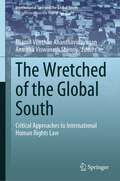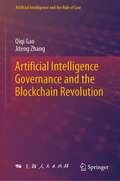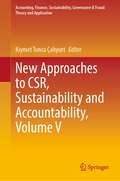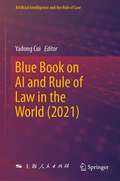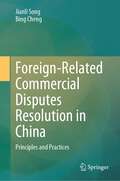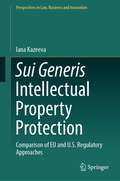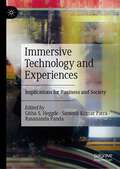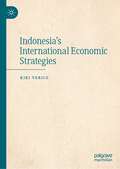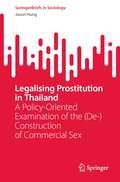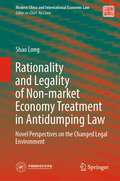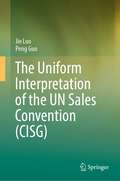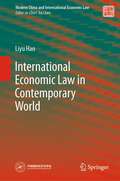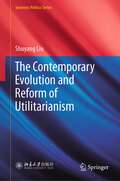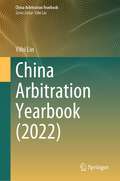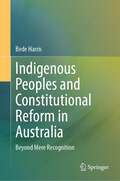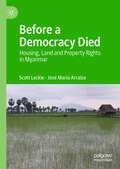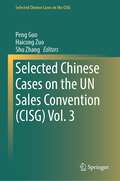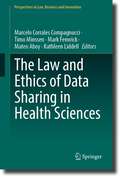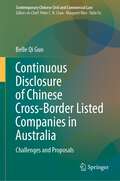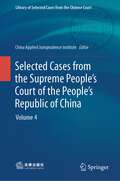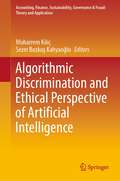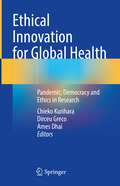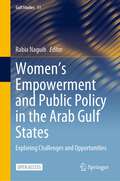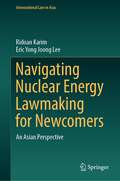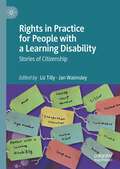- Table View
- List View
The Wretched of the Global South: Critical Approaches to International Human Rights Law (International Law and the Global South)
by Thamil Venthan Ananthavinayagan Amritha Viswanath ShenoyThe books aims to discuss and present an alternative epistemology of human rights, against the background of the globalization from below. The interdependent network of transnational networks, ranging from social movements, NGOs, and other groupings, questions the neoliberal paradigm and a particular set of human rights. This book wishes to transform this discourse on human rights and amplify the subaltern voices. The book also aims to highlight alternative practices of freedom that decenter human rights as a liberation discourse. Following Julia Suarez-Krabbe in “Race, Rights and Rebels”, the authors aim to amend to practices of freedom that center different orders of knowledge on subjectivity and agency. The proposed book, first, situates the problem of representation of the marginalized voices in contemporary legal and political discourse. Second, it offers critiques in theory, and, third, followed by alternative practices that emanate from marginalized localities. In particular, this book wishes to reflect upon alternatives rooted in legal and non-legal responses to address human rights grievances. In the end, this book envisages, along the lines of Frantz Fanon, to vision the possibility of the human by a new concept, addressing the concerns in various ways: As Fanon argued for “a new start”, “a new way of thinking”, and for the creation of a “new man”, it is pertinent to trigger a human rights project from the below.^
Artificial Intelligence Governance and the Blockchain Revolution (Artificial Intelligence and the Rule of Law)
by Qiqi Gao Jiteng ZhangThis is the first professional academic work in China to discuss artificial intelligence and blockchain together. Artificial intelligence is a productivity revolution, and its development has a significant and profound impact on global changes. However, at the same time, its development also brings a series of challenges to human society, such as privacy, security, and fairness issues. Therefore, the significance of blockchain is even more prominent. Blockchain is a revolution in production relations, which will propose important solutions to the challenges of privacy, security, and fairness that arise after the development of artificial intelligence. The book not only discusses the problems currently faced by the development of artificial intelligence, as well as the new opportunities and challenges that artificial intelligence brings to future global governance, but also explains the further development direction of the intelligent revolution from the perspective of blockchain.
New Approaches to CSR, Sustainability and Accountability, Volume V (Accounting, Finance, Sustainability, Governance & Fraud: Theory and Application)
by Kıymet Tunca ÇalıyurtThis book continues the discussion from the first four volumes on the challenges that organizations face in order to implement sustainability, ethics, and effective corporate governance, all of which are important elements of “standing out” from other companies. Examining the background of the New European Consensus on development with the new guiding motto ‘Our World, Our Dignity, Our Future,’ the authors explore how this new legislation on sustainability issues around the world is forcing companies to deal directly with sustainability issues. The 2030 Agenda for Sustainable Development (2030 Agenda), adopted by the United Nations in September 2015, is the international community’s response to global challenges and trends in connection with sustainable development. With the Sustainable Development Goals (SDGs) at its core, the 2030 Agenda is a transformative political framework designed to eradicate poverty and achieve sustainable development globally. It balances the economic, social, and environmental dimensions of sustainable development, including the key issues of governance and peaceful and inclusive societies, and recognizes the essential interlinkages between its goals and targets, i.e., that they must be implemented as a whole and not selectively. The respective chapters in this volume raise a number of questions regarding corporate social responsibility, ethics, and corporate governance in the face of new technology and new approaches to climate change and sustainability reporting.
Blue Book on AI and Rule of Law in the World (Artificial Intelligence and the Rule of Law)
by Yadong CuiThis book focuses on the development of artificial intelligence and rule of law in the world, by collecting and summarizing the information about the development of artificial intelligence and rule of law in China and the world, covering topics like AI strategy, policy, law, theoretical research and practical application, etc. It makes an in-depth analysis so as to provide an objective, fair and accurate report. The purpose is to promote the study of AI and law, promote the construction of AI and rule of law system and create an AI and rule of law environment. In particular, it aims to play an active role in promoting the establishment of legislative norms, legal systems, policy systems and ethical norms that are compatible with the innovative development of AI, promoting the implementation of a new generation of national AI development strategies, ensuring the safe, reliable, controllable, healthy and sustainable development of AI. It is hoped that this book may provide useful reference for researchers of AI and law.
Foreign-Related Commercial Disputes Resolution in China: Principles and Practices
by Jianli Song Bing ChengCombining the author's many years of legal practice experience, this book examines the current hot and difficult issues arising in the legal practice of foreign-related commercial disputes in China. The book focuses on the application of the United Nations Convention on Contracts for the International Sale of Goods (“CISG”) in Chinese courts, judicial review of foreign-related arbitral awards, judicial cooperation in cross-border insolvency, and legal relationships in legal disputes over electronic commerce. The book pays close attention to the latest legislative achievements of the international community and their impact on Chinese judicial practice, thus helping to strengthen exchanges and cooperation among countries along the “Belt and Road” and providing more effective rule of law protection for Chinese enterprises “going global”.
Sui Generis Intellectual Property Protection: Comparison of EU and U.S. Regulatory Approaches (Perspectives in Law, Business and Innovation)
by Iana KazeevaThe standard forms of intellectual property protection, namely, copyright, patents, trademarks and trade secrets, have a long history and are well regulated in the legislative systems of most jurisdictions. However, there are specific kinds of subject matter that, due to their characteristics, cannot be adequately protected by these standard forms of intellectual property instruments. At the same time, these categories of subject matter require legal protection in order to ensure the balance between the public's access to these creations and the creators' rights. For these reasons, many jurisdictions introduce a special form of intellectual property protection, namely, sui generis regime, i.e., intellectual property legal regime “of its own kind”, designed to serve the specific needs of a particular subject matter. This book analyzes the intellectual property protection regimes in the EU and the U.S. available for three categories of subject matter that are often considered as requiring sui generis protection, namely, databases, designs and plant varieties. One of the main objectives is to evaluate whether the chosen subject matter in fact requires sui generis intellectual property protection and whether the introduced sui generis regimes have proved to be successful over time. The final chapter of this book analyses the perspectives of sui generis intellectual property protection for works generated by AI systems. This volume offers a comprehensive analysis of sui generis intellectual property rights and will be a key source for both scholars and practitioners with an interest in intellectual property law.
Immersive Technology and Experiences: Implications for Business and Society
by Githa S. Heggde Santosh Kumar Patra Rasananda PandaThis book provides a comprehensive overview of the role of immersive technology with multiple sectoral perspectives, such as entertainment, education, health care, and more. It covers a detailed analysis of the latest trends and developments in the field. It encompasses practical insights on using immersive technology effectively through industry expert chapters, case studies, and real-world examples that demonstrate how immersive technology is being used in different industries. Chapters in this book are from academicians and industry professionals to create a fine balance of knowledge and practice perspective of today’s immersive technology. It is written in accessible language that is easy for non-experts to understand. It focuses on the future of immersive technology, exploring its potential impact on society and the economy. It provides insights into the challenges and opportunities that lie ahead and offers predictions on how immersive technology will continue to evolve in the years to come. It is a valuable resource for anyone learning more about immersive technology.
Indonesia's International Economic Strategies
by Kiki VericoThis book discusses Indonesia's international economic strategies. It examines unilateral aspects, foreign direct investments, bilateral economic relations, regional elements, ASEAN's role, and the Indo-Pacific's dynamic frameworks. Starting at the unilateral level, the book outlines how Indonesia managed its macro-economy to recover quickly and adequately from 2020 to 2021 amidst the global COVID-19 pandemic. It argues that Indonesia needs an open economic principle to enhance trade and investment relations. In addition, the book elaborates on how Indonesia transforms its economy with export-oriented long-run investment (Foreign Direct Investment) inflows as a necessary condition for economic transformation as it fits with Indonesia's manufacturing sector, which is critical to the country. Further, the book thoroughly explains Indonesia's bilateral economic relations, from its production networks with Indonesia's major partners to their impacts. It highlights the products which will provide enormous potential benefits for the country. The book also covers regional and mega-regional aspects of Indonesia's economy. Focusing on the Association of Southeast Asian Nations (ASEAN), it emphasises the regional organisation's three essential principles for economic integration: openness, convergence, and inclusiveness. In doing so, research in the book also includes perspectives on how ASEAN sees Asia and the Indo-Pacific framework. It also argues that ASEAN needs centrality in enlarging its economic cooperation with other countries or regions and how a member state's unilateral and bilateral liberalisation are building blocks for ASEAN.
Legalising Prostitution in Thailand: A Policy-Oriented Examination of the (De-)Construction of Commercial Sex (SpringerBriefs in Sociology)
by Jason HungThis book problematises the socioeconomic and institutional construction of prostitution in Thai contexts, identifying the root causes that propel underprivileged, discriminated and deprived women and girls to enter the sex industry. The author considers Thailand’s tolerance of prostitution and sex trafficking, despite criminalising prostitution since 1960. In doing so, they explain how criminalising prostitution does not lower the odds of women and girls engaging in commercial sex, but rather, legally marginalises them from receiving the necessary social and healthcare support. The book highlights that neither can Thailand pragmatically practice a zero-tolerance stance against prostitution - primarily due to severe police corruption and its heavy reliance on the sex tourism economy to support the national economic growth - nor is Thailand willing to fully crack down on the domestic sex industry. Engaging in an evaluation of how legalising and decriminalising prostitution, along with continuing to implement policies and interventions that alleviate the root causes of prostitution, can help Thailand build a more inclusive society and less-prostitution-reliant economy in the long term, the book provides a nuanced understanding of the relationships between society, inequality, governance, criminality, and policy in Southeast Asian contexts. It is relevant to students and researchers in sociology, socio-criminology, public policy, government and Southeast Asian studies.
Rationality and Legality of Non-market Economy Treatment in Antidumping Law: Novel Perspectives on the Changed Legal Environment (Modern China and International Economic Law)
by Shao LongThis book serves as a comprehensive study of and provides rich insight into non-market economy treatment, including its past, present, and estimated future practices and implications. It explores the introduction of the market and non-market economy dichotomy into international trade law. It traces the origin and development of non-market economy treatment against changing international economic and political background. The book examines this treatment in light of the rationale underlying anti-dumping, reflecting its alleged significance of ensuring fair trade. It in particular investigates the varied non-market economy treatment practices responding concerns of China’s rising as a large state-led economy, analyzing the deviation of NME treatment into an all-in trade tool. The book argues against preconceived bias and unilateral protectionism. It highlights the universal existence of government involvement in the market and proposes objective assessment of its impact on fair trade. Final proposition of the book is depoliticizing trade, reforming comprehensively international trade rules to carefully calibrate different values, including promoting fairness and enhancing global social welfare. It envisages a multi-dimension overhaul of international trade rules to rebalance trade interests, rather than roughly labeling an economy to confer different treatment, the practices of which lead to separation and chaos. The book is of particular relevance and interest to economies-in-transition, and among policy makers, academicians and legal practitioners engaged in trade remedies and trade rules reconstruction.
The Uniform Interpretation of the UN Sales Convention (CISG)
by Jie Luo Peng GuoThe unification of international commercial law has been a common course for every country of the world. The U.N. Convention on Contracts for International Sale of Goods (CISG) is a milestone in creating a uniform law in the field of the international sale of goods. The CISG coordinated divergent political, economic, and legal systems combined different contract laws and set up a comprehensive and independent legal framework for the international sale of goods. This book examines the basic requirements and criteria of the CISG’s interpretation and investigates how to achieve the uniform interpretation of the CISG based on interpretation rules in the CISG and through appropriate legal interpretation approaches. As a comprehensive and uniform legal framework for the international sale of goods, the CISG still has gaps to fill. Therefore, a uniform interpretation in gap-filling is equally important for the CISG. This book discusses gap-filling in the CISG, explains why and how to fill its gaps, clarifies gap-filling approaches, their order of application, and eventually concentrates on general principles and the uniform interpretation of the CISG. Another feature of the book is to discuss the supplementary materials that could be used to assist in the uniform interpretation of the CISG. PICC, foreign cases, UNCITRAL Digest, and the CISG Advisory Council opinions will be examined in detail to see whether and how they can fill the gaps in the CISG and promote its uniform interpretation. Only by clarifying the basic requirements and principles relating to the CISG’s uniform interpretation, can courts and arbitral tribunals correct their attitude toward and practices in the interpretation of the CISG. Only by following the autonomous interpretation approach, can the CISG achieve its goal to unify the sale of goods laws and promote the development of international commerce.
International Economic Law in Contemporary World (Modern China and International Economic Law)
by Liyu HanThis book focuses on the real themes in various areas of international economic law and explores the key elements behind the written rules. The advantage of this approach is that these themes or elements apply to all types of countries, whether developed or developing, whether market-based or not, and to trade, investment, or other transactions.This book reflects the author's thoughts and views on international economic law and its application based on his experience advising government departments and entities, particularly insights into the U.S.-China trade war from the perspective of a Chinese scholar. This feature makes the book very different from other books published before the U.S.-China trade war or textbooks that simply introduce the relevant subjects and provokes readers to think deeply about the relevant issues.
The Contemporary Evolution and Reform of Utilitarianism (Interests Politics Series)
by Shuyang LiuThis book is a monograph on contemporary utilitarianism, focusing on its evolving path and logic. It describes the evolution of utilitarianism from the classical model to the contemporary model and then summarizes the characteristics of contemporary utilitarianism, revealing its advantages and disadvantages. This book points out that the best characteristic of contemporary utilitarianism is to give up traditional view of individualism and take balanced attitude to the relationship between individual and community. The change makes the goal of contemporary utilitarianism from the pursuit of maximizing the sum of individual utilities to optimal social utility. Therefore, the contemporary utilitarianism gradually evolves a public philosophy with multiple interests structure, which provides a new way to solve the contradiction between personal interest and public interest.Utilitarianism is still an important political philosophy in western society, but its existing defects actually make it difficult to have a transformative impact on western institutional structure and system. The target audience of this book are students and researchers majoring in politics and ethics.
China Arbitration Yearbook (China Arbitration Yearbook)
by Yifei LinThis book presents a selection of the latest arbitration cases, materials, and commentaries from China. It aims to provide information on the theory and practice of arbitration combined. It is intended to provide readers with a useful resource to guide them when they encounter actual China-related arbitration cases. This book is a valuable resource for all practitioners concerned with international and foreign-related arbitration matters in China, global law firms, companies engaged in multinational business, jurists, and academics.
Indigenous Peoples and Constitutional Reform in Australia: Beyond Mere Recognition
by Bede HarrisThis book examines whether Australia’s constitution should be reformed so as to enable the country to fulfil its obligations under the United Nations Declaration on the Rights of Indigenous Peoples, which it ratified in 2009. The book surveys the history of the constitutional status of Australia’s Indigenous peoples from the time of colonisation through to the current debate on ‘Indigenous constitutional recognition’. However, it argues that the term ‘Indigenous constitutional recognition', implying that mere acknowledgement of the existence of Indigenous peoples is sufficient to meet their legitimate expectations, misrepresents the nature of the project the country needs to engage in. The book argues that Australia should instead embark upon a reform programme directed towards substantive, and not merely symbolic, constitutional change. It argues that only by the inclusion in the constitution of enforceable constitutional rights can the power imbalance between Indigenous Australians and the rest of society be addressed. Taking a comparative approach and drawing upon the experience of other jurisdictions, the book proposes a comprehensive constitutional reform programme, and includes the text of constitutional amendments designed to achieve the realisation of the rights of Australia’s Indigenous peoples. It ends with a call to improve the standard of civics education so as to overcome voter apprehension towards constitutional change.
Before a Democracy Died: Housing, Land and Property Rights in Myanmar
by Scott Leckie José María ArraizaThis volume is a collection of chapters based on work within Myanmar by the authors between 2009 and 2021 while working to improve housing, land and property rights for the population. Despite the extensive application and political uptake of their work throughout the country during the brief democratic reform period of 2011-2021, and measurable progress being made, their work and that of the entire HLP community was brought to a sudden stop following the unexpected military coup in February 2021. Many of those with whom the authors worked closely on various HLP matters are no longer able to work safely on these issues in Myanmar. Others have fled the country and are now refugees, while others continue to face daily persecution and harassment by the military regime. These texts will be of great interest to scholars and activists in the region.
Selected Chinese Cases on the UN Sales Convention (Selected Chinese Cases on the CISG)
by Peng Guo Haicong Zuo Shu ZhangThis book focuses on Chinese cases on the CISG decided by Chinese courts of all levels, focusing on 2011 to 2012. During this period, the number of cases grew fast compared to 2006 to 2010. The total number of cases remained relatively low, the reasons of which might be the following: parties were not familiar with the CISG and therefore decided to opt out of it; in addition, the case collection and report systems in China at that time were not as developed as now, rendering many cases inaccessible. This book provides a comprehensive and detailed analysis of selected cases. The analysis of those cases is on a case-by-case basis. For each case, an English summary of the judgment is provided. In the comment, the People’s Courts’ approach to the interpretation and application of the CISG is emphasized. Comments of the individual case are written either by scholars or judges or lawyers from international and comparative perspective to discuss the successes and pitfalls of the interpretation and application of the CISG.
The Law and Ethics of Data Sharing in Health Sciences (Perspectives in Law, Business and Innovation)
by Marcelo Corrales Compagnucci Timo Minssen Mark Fenwick Mateo Aboy Kathleen LiddellData sharing – broadly defined as the exchange of health-related data among multiple controllers and processors – has gained increased relevance in the health sciences over recent years as the need and demand for collaboration has increased. This includes data obtained through healthcare provisions, clinical trials, observational studies, public health surveillance programs, and other data collection methods. The practice of data sharing presents several notable challenges, however. Compliance with a complex and dynamic regulatory framework is essential, with the General Data Protection Regulation being a prominent example in a European context. Recent regulatory developments related to clinical trial transparency, trade secrecy, data access, AI training data, and health data spaces further contribute to the difficulties. Simultaneously, government initiatives often encourage scientists to embrace principles of “open data” and “open innovation.”The variety of regulations in this domain has the potential to impede widespread data sharing and hinder innovation. This edited volume, therefore, compiles comparative case studies authored by leading scholars from diverse disciplines and jurisdictions. The book aims to outline the legal complexities of data sharing. By examining real-world scenarios from diverse disciplines and a global perspective, it explores the normative, policy, and ethical dilemmas that surround data sharing in the health sciences today.Chapter Patient Perspectives on Data Sharing, Chapter Supplementary Measures and Appropriate Safeguards for International Transfers of Health Data after Schrems II are available open access under a Creative Commons Attribution 4.0 International License via link.springer.com.
Continuous Disclosure of Chinese Cross-Border Listed Companies in Australia: Challenges and Proposals (Contemporary Chinese Civil and Commercial Law)
by Belle Qi GuoThis book studies an overarching question of the challenges faced by Chinese lawmakers, Chinese listed companies, Chinese companies’ external advisers, and securities regulators in dealing with Chinese cross-border listed companies’ continuous disclosure in Australia, and how can these challenges be addressed. Chinese listed companies are struggling to meet the continuous disclosure requirements while listing in Australia and have even been depicted as having poor corporate governance and transparency. Many get delisted from the securities market in Australia subsequently due to non-compliance in continuous disclosure or are straight rejected from listing because of continuous disclosure compliance concerns. This book cuts in from this angle and delves deep into the overarching question through the following four sub-questions: What are the theories and policies behind the continuous disclosure regimes in Australia and China and how have they been differently implemented in the securities markets in these two countries? What are the deficiencies, at the intracompany level, contributing to Chinese cross-border listed companies’ non-compliant continuous disclosure in Australia? What are the limitations, from the perspective of external advisers’ efforts, contributing to Chinese cross-border listed companies’ non-compliant continuous disclosure in Australia? What are the difficulties, at the regulatory level, contributing to Chinese cross-border listed companies’ non-compliant continuous disclosure in Australia? In addressing these questions and putting forward corresponding reform proposals, this book takes not only legal but also historical, cultural, and political-economic factors into consideration.
Selected Cases from the Supreme People’s Court of the People’s Republic of China: Volume 4 (Library of Selected Cases from the Chinese Court)
by Feng Zhu Wenyan Ding Hongyu Han Qiujing MaThis book includes focal and vital cases tried by presiding justices, guiding cases from the Supreme People’s Court, and cases discussed at the Joint Meetings of Presiding Judges from various tribunals. This book is divided into three sections, including Cases by Justices, Guiding Cases, and Typical Cases, which will introduce readers to Chinese legal processes, legal methodology, and ideology in an intuitive, clear, and accurate manner. This book presents cases selected by the trial departments of the Supreme People’s Court of China from their concluded cases. In order to give full weight to the legal value and social function of cases from the Supreme People’s Court, and to achieve the goal of “serving the trial practices, serving economic and social development, serving legal education and legal scholarship, serving legal exchanges among Chinese and foreign legal communities, and serving the rule of law in China”, the China Applied Jurisprudence Institute, with the approval of the Supreme People’s Court, opts to publish Selected Cases from the Supreme People’s Court of the People’s Republic of China in both Chinese and English, for domestic and overseas distribution.
Algorithmic Discrimination and Ethical Perspective of Artificial Intelligence (Accounting, Finance, Sustainability, Governance & Fraud: Theory and Application)
by Muharrem Kılıç Sezer Bozkuş KahyaoğluThis book delves into the complex intersection between artificial intelligence and human rights violations, shedding light on the far-reaching implications within the framework of discrimination and the pivotal role equality bodies play in combatting these issues. Through a collaborative effort between the Human Rights and Equality Institution of Türkiye (HREIT) and Hasan Kalyoncu University, the groundbreaking "International Symposium on the Effects of Artificial Intelligence in the Context of the Prohibition of Discrimination" took place on March 30, 2022, in Gaziantep. This book is the outcome of this symposium, bringing attention to the alarming issues of "bias and discrimination" prevalent in the application of artificial intelligence. With a commitment to Sustainable Development Goal 8.10 of safeguarding human rights in the digital realm and countering the adverse effects of artificial intelligence, this work is an essential contribution to the Human Rights Action Plan. Comprising an array of insightful chapters, this book offers an in-depth exploration of artificial intelligence technologies, encompassing a broad spectrum of topics ranging from data protection to algorithmic discrimination, the deployment of artificial intelligence in criminal proceedings to combating hate speech, and from predictive policing to meta-surveillance. It aims to serve as a call to action, urging societies and policymakers to acknowledge the potential threats posed by AI and recognize the need for robust legislative frameworks and ethical principles to ensure that international standards on human rights are upheld in the face of technological advancements.
Ethical Innovation for Global Health: Pandemic, Democracy and Ethics in Research
by Chieko Kurihara Dirceu Greco Ames DhaiThis volume captures the recent changes and evolution in ethics in research involving humans and provides future directions to achieve alternative drug development strategies for equitable global health. It presents ethical considerations in current day clinical trials and new trends of ethics in research. It also describes the historical context, illustrates the process in alternative paradigms to achieve democracy after World War II, how the framework of ethics in research was established in different regions, and policies implemented to protect research participants from the exploitation of new drug development. The book is organized into three themed parts: relevant constructions from Brazil, South Africa, Taiwan, South Korea, and Japan; historical and international perspectives of principles of ethics in research; and alternative frameworks of clinical development and innovation. Ethical Innovation for Global Health: Pandemic, Democracy and Ethics in Research is an informative resource for academic researchers, the global pharmaceutical industry, regulators, civil society and other role players involved in global health. It is contributed to by leaders in global policy development in research ethics, and experts in drug development activities with its trajectory being global health. The COVID-19 pandemic, as a global disaster, necessitated not only socio-economic but also cultural transformation. While effective vaccines were developed under a successful new methodology, there remains inequity of distribution of these vaccines globally. The book re-engages with the notion of the primacy of distributing results of scientific innovation to those who most require the benefits.
Women's Empowerment and Public Policy in the Arab Gulf States: Exploring Challenges and Opportunities (Gulf Studies #11)
by Rabia NaguibThis open access book explores the various dimensions of women’s empowerment in public policy in the Gulf Cooperation Council (GCC) region, with a particular focus on Qatar, comparing the country to the other Gulf states. Through its rich compilation of empirical qualitative research, the text unpacks the various ways in which women’s empowerment materializes in the GCC context, providing insights into public policy perspectives in high-income rentier states more broadly. The Arab world has long been part of the global dialogue on women’s economic and political empowerment and the GCC has, over the past decade, situated women’s empowerment amongst their respective national priorities and long-term strategies. In turn, the Gulf has seen gradual implementation of policies aimed at women, specifically, in looking to attract and retain them in the labour market, and in the public sector more broadly. The collection surveys and evaluates the progress made in recent decades, paying close attention to the cultural and policy constraints still limiting women’s empowerment in the Gulf. With a key linkage to SDG5, this book is a timely text addressing the context and drivers behind policies centering on women in the Arab region, in its analysis of the interplay of international women’s empowerment discourse and regional public policy decisions. It is relevant to researchers and policy makers focused on women and gender issues in relation to social, cultural, economic, and political empowerment in the Gulf specifically, but also in the Arab world and beyond.
Navigating Nuclear Energy Lawmaking for Newcomers: An Asian Perspective (International Law in Asia)
by Ridoan Karim Eric Yong LeeThis book provides a comprehensive overview of the legal and regulatory framework for the nuclear industry from an Asian perspective. It includes information on the history of nuclear lawmaking, the key international treaties and agreements that govern the use of nuclear energy, the role of national and regional regulatory bodies, and the legal and policy issues that arise in the development and operation of nuclear power plants. The book also covers topics such as nuclear safety, security, waste management, environmental protection, and liability for nuclear accidents. Additionally, it provides insights into the legislative process and the various stakeholders involved in nuclear lawmaking, such as industry, government, and civil society organizations. The overall goal of this book is to provide a detailed and up-to-date understanding of the legal and regulatory framework for the nuclear newcomers, particularly in Asia, and to help readers navigate this complex and dynamic field.The book is also used as a guide for all nuclear energy-producing countries, lawmakers, students, researchers, or even for general readers to understand the perspectives of international nuclear energy law.
Rights in Practice for People with a Learning Disability: Stories of Citizenship
by Liz Tilly Jan WalmsleyThis book aims to raise awareness about the possibility of achieving the goals of the United Nations Convention on the Rights of Persons with Disabilities (UNCRPD), in order for all disabled people to enjoy the benefit of human rights. The stories of people who have been supported to enjoy their rights and their citizenship will enable readers to focus on how services and support can enable people with a learning disability to have their rights upheld, with an outcome of citizenship, independence and achievement. Despite the UNCRDP being in place since 2006, a significant number of learning disability service provider organisations and professionals in the UK are not aware of its existence. This book aims to bridge the gap between policy and practice to demonstrate the value of a human rights approach as the foundation for services and support for people with a learning disability.
